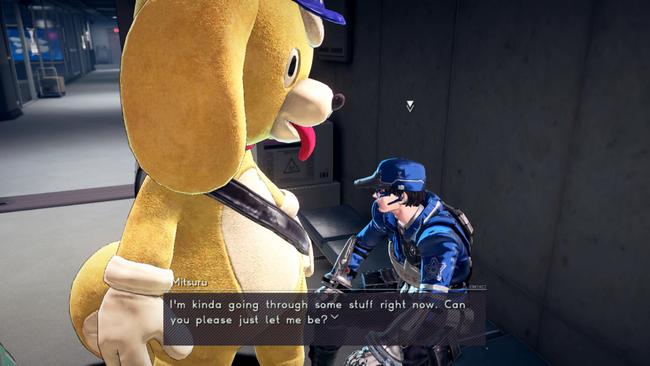Astral Chain Review
PlatinumGames’s latest work is in an identity crisis deadlock with itself and the result is a game that has a bunch of stunning design systems marred by a few significant downfalls. Astral Chain has strong visions of a lot of things it wants to excel in and sometimes gets caught up juggling too many to notice which ones are falling through the cracks.
It’s at its best when it wants to be experimental, yet it feels too bound to a tried and true formula constantly. I think what Astral Chain brings to the table when it focuses on being an action adventure game is fascinating, but its frequent platforming sequences are clumsy at best and the light stealth segments are poorly implemented. There’s also almost an effective heartfelt police story revolving around a family in it initially, though the underlying god complex plotline gradually undermines it.
Astral Chain is an intriguing beast of a game that isn’t quite sure what it wants to be at the end of the day. Despite all this, it’s a wonderful bundle of mechanics in concert with one another - even if its execution is a bit messy.
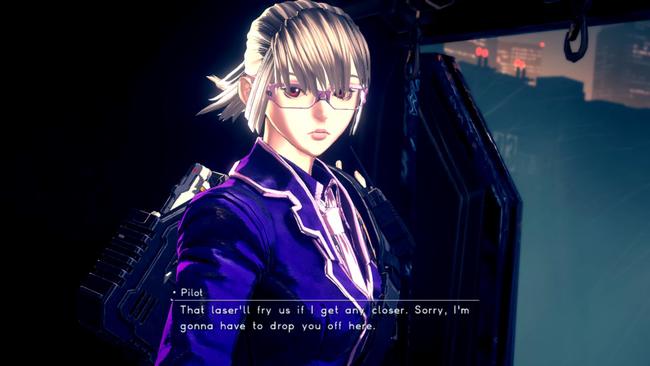
There’s a lot going on from the get-go. You take control of one of two twins that’ve been promoted to Neuron, a special police task force that combat the extradimensional Chimera invaders. Both of these twins happen to possess a special trait allowing them to control Legions; these leashed minions are the only tools left in protecting humanity’s last bastion on Earth, aptly named the Ark, from the aforementioned threats.
Unfortunately, whichever of the twins you choose to control will be silent for the entire game outside of battle grunts and what not. It’s a jarring experience because it felt like I was penalized for choosing the female twin, so the male twin is rewarded with having a personality to act as a proxy for me. Everyone else is quite chatty and lively so it’s a bummer to see my character only respond with the occasional “Hmph!” to them. I don’t usually mind silent protagonists in other games, but Astral Chain’s way of handling it is more akin to a punishment rather than a compelling self-insert.
Be that as it may, its narrative presentation exudes a slick late 80s ragtag crime drama atmosphere sprinkled with the PlatinumGames over-the-top polish. Playful camerawork of rapid diagonal zoom-in shots paired with exaggerated swoosh sound effects for oomph keep the tempo up even when not a lot is actually going on. The soundtrack is an excellent mix of heavy rock and orchestral symphonies that PlatinumGames loves to play up; there’s even a late title card that follows an opening intro much like a TV anime.
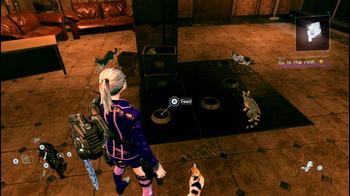
The thing that irks me is that Astral Chain’s characterization for the majority of its side characters feels flat. It gave off the vibe that it was just going through a checklist for them. Throughout much of its first half, chapters focused on a certain member of the squad you were assigned to; they’re somewhat fleshed out with nice moments through the occasional flashback here and there. Once that chapter wraps up, the game barely acknowledges them again as they’re relegated back to being a quest giver at best. Astral Chain wants you to care about your teammates, but it does a poor job of keeping them in the fold as it marches on. The game wants to give players the feeling of a one-man army instead.
In some ways, Astral Chain is an odd, yet welcome, departure of the standard PlatinumGames formula. Instead of moving from one action sequence to the next with sparse downtime, a remarkable chunk of Astral Chain is spent away from bashing on foes to focus on ongoing investigations. These range from brief simple tasks through blue cases or more involved activities inside red cases; the characters involved in them often provide red-marked keywords that may be related to the bigger case at hand. Once you’ve obtained enough keywords, you’ll be piecing together what’s relevant as you get a better understanding of what went down in the area you’re in. You’ll usually find the action later in a chapter as you start pursuing the truth head-on.
These areas where you conduct investigations are relatively wide open areas. They’re some of the most enjoyable areas to explore for me because they’re populated enough to feel lively and lived in. I enjoyed popping up my IRIS detective vision to spot the out-of-the-way elevated treasure chests and figure out how to get to them. Since Astral Chain doesn’t really have a dedicated jump button, you’ll have to rely on moving your Legion to the right spot and having them yank the chain for you to hop on over to them. There’s some clever level design hidden in these spaces and discovering them was a blast.
Astral Chain’s investigation segments work for the most part; they often utilize the non-combative skills of the Legions and those are my favorite aspects about them. My qualms on the game’s aspect of policing only surfaced when it oversimplified some of the more down-to-earth issues in “helping” fellow citizens. Whether it be chasing down graffiti artists trying to express themselves or busting a drug deal by beating down young adults with my X-Baton, it’s a bit of a misstep for Astral Chain from a contemporary lens. Nevertheless, the game is largely harmless as it tries its best to sidestep deeper issues of the police force’s relation with civilians by leaning its tale more on the intrusive Chimeras emerging from dimensional gates rather than the inner workings of a society pushed to the brink of an apocalypse.
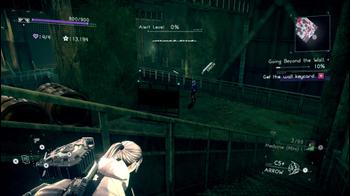
Pursuing perpetrators often leads players into the Chimeras’ homeworld, the Astral Plane. It’s not only where most of the fights take place, but it also functions as Astral Chain’s dungeons. If you’re not plunged into a battle arena right away, you’ll have to find your way to them. I found that Astral Plane sections aren’t exactly all that thrilling. The environmental puzzles themselves were alright, yet the dullness in the environment’s design never faded. It quickly becomes a chore to navigate it because there’s nothing interesting to really look at.
The Astral Plane also contains a lot of Astral Chain’s platforming sequences and they’re all bad. When I’m seeking out treasures during my sleuthing, it’s relatively stress free because there’s no penalty if I fail to reach a platform. In the Astral Plane, a chunk of your health is taken as your Legion has to throw you back up onto the platform to try again. I don’t think Astral Chain’s method of platforming is well-suited for more fine-tuned, precise chain jumps and its wonky, unreliable camera further highlights the problem.
Camera issues dampened my overall experience with Astral Chain. Fighting enemies in closed spaces was never a pleasant time. I couldn’t see my character half the time if she was backed up against a wall. This is a pretty significant problem because if I can’t see my character in Astral Chain, I can’t see my Legion’s remaining HP to quickly check if they’re in danger. A constant stream of attacks from off-screen made my encounter with enemies double as a battle with the camera to cooperate with me as well. Even when the camera is playing nice, I also had to be wary of how I positioned my Legions in combat because it’s all too easy for them to cover an enemy’s model in a way that obfuscated my view to determine what kind of attack they’d pull out next.
When I was able to find ways to minimize these irritating issues to some degree, Astral Chain’s battle system is just downright amazing. There’s a certain pace and flow to it that distinguishes it from other action titles. Manipulating the five different kinds of Legions in tandem with the three weapon types gave me a distinct sense of freedom; it controls responsively with all the bells and whistles I’d expect from a PlatinumGames title including dodge offsetting combo strings and counterattacks from dodging at the last possible second before an attack hit me.
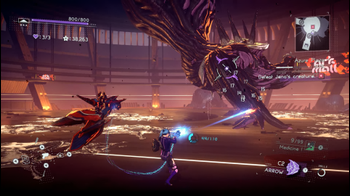
I was surprised to see the amount of unique animations each Legion had depending on what kind of weapon you’re wielding. Every Legion has the ability to sync attack during your combos and, as the name says, will synchronize their next attack as you fire off yours. Each of these sync attacks behave differently per Legion. For instance, the blaster fires off a shotgun spread with the Sword Legion, a ranged sniper shot with the Arrow Legion, and powered up burst shots from the air with the Beast Legion. There’s even different sync attacks depending on the state of your character, so variety isn’t in short supply when it comes to how you want to play in Astral Chain.
Another aspect I appreciated in Astral Chain’s battles is well… the astral chain itself. The leash on your Legions is an immensely useful tool that left me wishing it was expanded upon more. It can tie up groups of foes, fling enemies back from charge attacks, and several Legion-specific skills are tied to it. A fun way to also utilize it is starting up a skill that unbinds the astral chain from a Legion and quickly summoning a second Legion before your first Legion finishes up its assault.
Mastering the astral chain can seem overwhelming at first. After all, the game is trying to wrap your head around controlling both your character and your Legion simultaneously. Each bind requires you to circle the chain around enemies and consecutive ones will keep them tied up shorter. Eventually you can learn an active skill to have Legions restrain Chimeras on their own. I think the game’s bosses fail to capitalize the potential of it though. None of them encourage creative ways to weave the astral chain or involve multiple Legions in intricate ways. I was waiting for later showdowns to have them more involved and only the final boss provided a glimpse of how much better the other bosses could’ve been. The astral chain can still bind them up temporarily, but not much more is gained from using it on them. Instead, you can pretty much rely on your own tried and true tactics with the occasional Legion switch to break through a barrier mechanic to deal damage again.
Powering up Legions is probably the closest thing to a RPG mechanic in Astral Chain, besides displaying damage numbers. Each of them has their own unique skill trees, though a chunk of them are redundant. Every Legion will have skills like auto-binding, powering them up briefly, perfect calls to counter incoming attacks, and such; they still each possess a handful of exclusive skills, though it feels somewhat diluted. Legions can also equip passive abilities too.
As far as technical performance is concerned, Astral Chain largely holds up both on docked and on handheld. I appreciated that PlatinumGames gave separate option tabs for them so you wouldn’t have to fiddle with it every time you switch from one to the other. Though the framerate can maintain 30fps most of time, there’ve been minor instances of noticeable dips outside of battle - especially at a very open locale with multiple floors in the second half of the game. The font size for mission descriptions are a little too small for me on-the-go, but the quest markers help mitigate it a bit.
Astral Chain has a lot of nifty quality-of-life features and extras. Past levels are divided up into chunks so you don’t have to replay all of them from the very beginning if you’re looking to improve your ranking on a specific fight or enter a previously inaccessible area since you didn’t have the right Legion to access it yet. There’s a myriad of unlockable fashion items for your playable character and editable color palettes for both character and Legions. In fact, you can not only open up new color options for your UI, but also unlock the option to alter its opacity as well. It took me just about 30 hours to finish the main game and most of the quests along the way; finishing it once unlocks a new difficulty level and several new post-game cases to check out.
When all is said and done, I think Astral Chain is a special game. There’s not anything else that’s quite like it and I admire how much it shakes up the PlatinumGames formula. It doesn’t fully succeed at everything it sets out to do, but the foundation is solid enough to improve upon. Astral Chain is an exhilarating ride that never let go of me once it clicked. If it ever sees a follow-up that irons out its problems, then PlatinumGames may truly have another new classic on the horizon.
